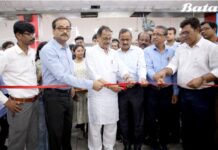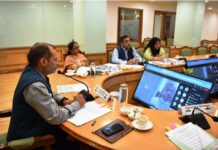
The participants in the meeting included Labour Ministers from the State Governments, Smt. Gauri Kumar, Secretary, Labour & Employment, Vice Chairman, Workers,Vice Chairman, State Governments,Vice Chairman, Employers,Representatives of Central Trade Unions, Representatives of Employer Organizations, Delegates from Central Ministries/Departments and the State Governments, Officials of Ministry of Labour & Employment
The Minister said, the Indian Labour Conference has sometimes been called as the Parliament of Labour in India. The genesis of a number of labour legislations in India can be traced back to Resolutions passed in the Indian Labour Conference. The decisions taken in the respective ILCs serve as a guideline to respective governments for legislative changes. In recent years, the ILCs have come out with a number of important recommendations in the field of employment generation, skill development, minimum wages, contract labour and conditions of work. A number of these concerns have recently been voiced by the Trade Unions. While some of the decisions are of administrative nature, a number of decisions like contract labour, minimum wages, etc. require legislative changes after detailed consultations with a number of other Ministries. Our government has already set up a Group of Ministers to go into the demands raised by the Trade Unions and I am confident that soon we will see forward movement on some of these issues.
He said Employment generation is one of the top most priorities of our Government. During the period between 2009-10 and 2011-12, we created 10 million additional job opportunities. During this period, employment in the organized sector also increased by more than 9% from 26.5 million in 2005 to 29 million in 2011.
Shri Fernandez said due to the agricultural nature of our economy, our main problem is disguised and seasonal unemployment rather than open unemployment. That is why we have been following active labour market policies specially for catering to seasonal employment in the rural areas. Our Government has also made serious efforts in implementing various employment generation programmes such as Mahatma Gandhi National Rural Employment Guarantee Act (MGNREGA), National Rural Livelihood Mission, Swarnajayanti Shahari Rozgar Yojana and Prime Minister’s Employment Generation Programme. There have been increases in allocations of these schemes over the years which have provided employment opportunities to large number of men and women, particularly persons belonging to Scheduled Castes, Scheduled Tribes and Other Backward Classes. MGNREGA has been particularly helpful in reducing inter-State migration, eliminating bonded labour and raising the purchasing power of the rural households. Women participation under the scheme has been more than 48%.
He said we have also tried to address the supply side variables for employment generation. Skill development is critical to our efforts for increasing the employability of our workforce and for providing decent employment opportunities to our large and growing young population. A skilled workforce is also required for the achievement of our objective of rapid and inclusive growth. Therefore, we have laid special emphasis on skill development. Our aim is to skill 5 crore people by the end of the 12th Plan. During the last five years, the number of Industrial Training Institutes (ITIs) in the country has doubled from about 5000 to about 10000. About 1700 Government ITIs are being modernized. The Modular Employable Skills (MES) programme of the Ministry of Labour & Employment provides short duration courses to prospective trainees using both Government and private infrastructure.
The minister said, Government is committed to improve the social protection of the our workforce. We have started a number of schemes for providing death cover, disability cover, sickness cover and old age cover to the vulnerable segments of our population. The Rashtriya Swasthya Bima Yojana (RSBY) was launched in 2008 to provide for smart card based hospitalization facilities to workers in the unorganized sector. We have been expanding the reach of the Rashtriya Swasthya Bima Yojana (RSBY) to cover larger numbers of workers in the informal sector. Under this scheme, 3.77 crore smart cards have been issued so far. The RSBY now covers additional categories of workers including rickshaw pullers, rag pickers, auto and taxi drivers, sanitation workers and mine workers besides construction workers, street vendors, domestic workers and even beneficiaries of the Mahatma Gandhi National Rural Employment. Also, Our Government enacted the Unorganized Workers Social Security Act, 2008 for the benefit of the workers in the informal sector.
The ESIC organization has undertaken a massive computerization project for more effective delivery of benefits to the insured persons. More than 10 million Pehchan Cards have been issued and a unique health identification number has been generated for each patient. As a part of medical education initiative, ESIC has started four medical colleges. Five more are likely to commence operation during 2014-15.
Following the modernization initiatives in the Employees Provident Fund Organization, 66% claims are being settled within 10 days. The Status of all Provident Fund Accounts is now available online along with SMS alerts for important account information. Payment is now possible through National Electronic Fund Transfer (NEFT).
He expressed hope for meaningful discussions in the day long meeting. Labour being a subject in the concurrent list, the success of all our endeavors is very much dependent on the active cooperation of State Governments. He said Labour & Employment ministry has been receiving continued cooperation of our social partners and we look forward to work with the same spirit in the coming days.





























